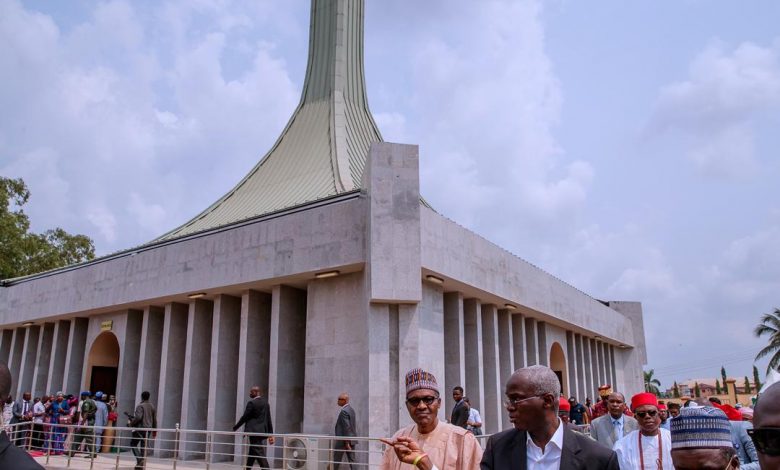
By Nwafor Okafor
Bleak emptiness stared our reporter in the face when he visited the Zik Mausoleum, the resting place of the first Nigerian president, the late Dr Nnamdi Azikiwe in Onitsha, Anambra State, recently.
The multi-million edifice built by the Federal Government as a mark of honour to the late sage was unkept and desolate. The lawns round the building were overgrown with weeds while the two-building complexes that made the Mausoleum was under lock and key.
A peep through the window showed liters of rodents’ faeces and dust on the Mausoleum’s floor, while spiders hard free- day web designs at the edges and corners of edifice.
The policemen who used to guard the complex were nowhere to be seen.
The mausoleum of the late statesman located at the Boromeo Junction on the outskirts of Onitsha, Anambra State was inaugurated in January, 2019 by President Muhammadu Buhari.
The project, initiated in 1997 by the late General Sani Abacha military regime, passed through different administrations and was later abandoned. It was when the Buhari administration came into power in 2015 that it promised to complete the project to honour the great Zik of Africa as Azikiwe was fondly called by his admirers.
The Mausoleum, apart from serving as a resting place for the late statesman, it has three conference halls, a library including an archive/museum. Inside the museum, there are Zik effigies depicting him as a boxer, footballer, an academic and a politician.
But the major problem confronting the place right now seems to be management.
A worker there who spoke to our correspondent on condition anonymity said they were being owed arrears of salaries.
“They said we’re under the Federal Ministry of Works and Housing, but they don’t pay us salary.
“So, nobody comes here for work. You can’t see anybody here from month to month. For me, I have decided to quit this job at the end of this year. I’m just wasting my time here”, the source said.
Asked how often Zik’s children visit the place, the source said,” None of them is around. They only come here if there is a burial. At end of such funeral, all of them will “disappear” from this place. Nobody is here.
Another worker who also spoke to our correspondent in confidence said they had not been properly absorbed as staff members of the federal government
The worker said, “The ministry inherited us from the contractor that built the place. We served as a guide to the ministry at some point before we were absolved by the ministry as its workers.
“But as of today, we learnt that we are being paid from the personal purse of the federal controller of works in the state. We are begging our President to ensure that we are fully employed as members of staff of the ministry. We are ready to contribute our quota in making the place a centre of excellence.’’
Continuing he said people from different places usually visited the place.
He said, “Many people come to apply that they want to use the place for weddings. But we rejected their applications because we don’t want to use it for such ceremonies.
“You know what Zik represented. Zik was a great academic and politician. The place is exclusively for conferences, seminars and symposia. It is not for marriage ceremonies. That’s why we are rejecting applications for weddings. There are many of such applications.’’
He added that letters from schools requesting to visit the place were rejected because some things they would need had yet to be put in place at the mausoleum.
“We are still awaiting the composition of the board. It is part of the things we are waiting for to ensure the proper take-off of the place.’’
The centre has four workers, excluding a manager.
Our correspondent who visited the mausoleum observed that apart from serving as a resting place for the late statesman, it has three conference halls, a library including an archive/museum.
In the museum, there are Zik effigies depicting him as a boxer, footballer, academic and politician. The museum and library have not been stocked with artefacts and books. In the library, only bookshelves have been fixed while the museum is empty.
The conference halls are furnished with state-of-the-art furniture.
Born in 1904, Zik known as the Owelle of Onitsha died in 1996. He was born in Zengru in the northern part of the country .
He was a Nigerian statesman and political leader who served as the first President of Nigeria from 1963 to 1966. Considered a driving force behind the nation’s independence, he came to be known as the “father of Nigerian Nationalism”
Speaking on Zik’s contributions to the Nigerian project, the National Chairman of the All Progressives Grand Alliance, Chief Victor Oye, said it was phenomenal.
He said, “Dr Nnamdi Azikiwe traversed Nigeria’s political landscape as a colossus. His contribution to the social, political and economic development of our nation can never be forgotten too soon.
“It was his selflessness, urbaneness, acuity and sagacity that helped immeasurably to shape the history of Nigeria.
“Don’t forget how he came back from Pennsylvania, the United States, where he had a paying job, to join the independence struggle. He founded the Morning Post newspaper in the then Gold Coast (now Ghana) in 1934 and later in 1937, relocated the paper to Lagos and rechristened it the West African Pilot, which triggered off a revolution of sort in the burgeoning newspaper business in Nigeria at the time.



